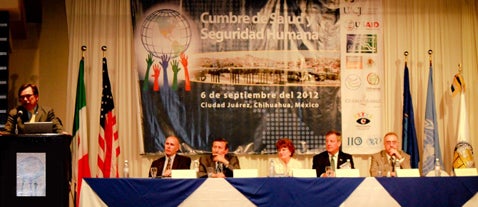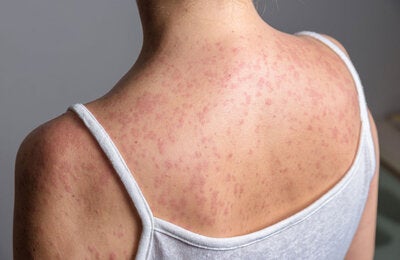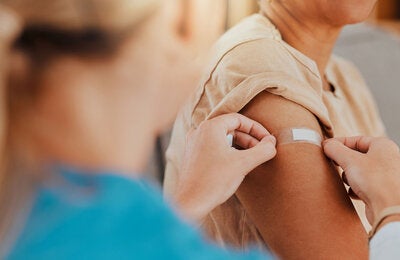

In honor of the 110th year anniversary of the Pan American Health Organization (PAHO) and the 70th year anniversary of the U.S.-Mexico Border Office, a Summit on Health and Human Security was held and attended by leading national and...
El Paso, TX, September 13, 2012 (PAHO/WHO) — In honor of the 110th year anniversary of the Pan American Health Organization (PAHO) and the 70th year anniversary of the U.S.-Mexico Border Office, a Summit on Health and Human Security was held and attended by leading national and international experts in human security and public health, representatives from all three levels of government, representatives from academia and international organizations.
Progress in matters of health and human security on the border were shared during the Summit, those that came from collaborative initiatives between public and private institutions, with civil society, and with international organisms, thereby generating options to combat the issues of security faced by border communities such as Ciudad Juarez, Reynosa, and Tijuana, among others.

Dr Felipe Fornelli Lafont, Sub-secretary of the Northern Region of the Chihuahua State Government showed that "the theme of security and human health has been transformed into a public health priority, and I am referring to human security, not only in the biological sense, but also the social and sociological senses; there are many factors that have contributed to changing this balance and one of them is the violence that is present in all the world." Dr. Fornelli added that the Observatory on Citizen Security and Conviviality of the Juarez Municipality is gathering information in all areas that make up human health in order to be able to generate recommendations not only to the three levels of government, but also to the community at large with the hopes of improving the quality of life.
Consecutively, Dr. Mirta Roses, Director of the PAHO, emphasized within her presentation that "as health improves human security increases; and as more human security health improves. Health problems can erode social stability, just like insecurity can deepen the vulnerability of human health."
The presidium comprised of:
- Francisco Javier Sánchez Carlos, Rector, Universidad Autónoma de Ciudad Juárez (UACJ)
- Dr. Mirta Roses Periago, Director, Pan American Health Organization/Regional Office for the Americas of the World Health Organization (PAHO/WHO)
- Mr. Thomas Delaney, Chief of Mission, United States Agency for International Development (USAID) in Mexico
- Dr. Felipe Fornelli Lafón, Representative of the Northern Region, Chihuahua Ministry of Health and representing the Government and Ministry of Health of the state
- Consul Ian Brownlee, United States Consulate in Ciudad Juarez
- Dr. Ariel Díaz de Léon, representing the Municipal President of Juarez
During the Summit experiences were shared from the Violence and Injury Prevention Initiative in Ciudad Juarez, designed and implemented by a multi-sectoral team from various institutions and organizations using public health as a focus. Among those that stand out are the PAHO/WHO, the United States Agency for International Development (USAID), the National Council for the Prevention of Accidents (called CONAPRA for its initials in Spanish) of the Mexico Ministry of Health, the Ministry of Health of the State of Chihuahua, the Municipal Government of Juarez, and the Universidad Autónoma de Ciudad Juárez (UACJ), among others.
The Chief of Mission of USAID in Mexico, Mr. Thomas Delaney, spoke about said initiative and collaboration with the PAHO/WHO and CONAPRA within the framework of the IV pillar of the Merida Initiative (Building Strong and Resilient Communities), and indicated that they are developing a model for violence and injury prevention with a focus on public health and a component of epidemiologic vigilance of violence and injury. "The model has contributed to the efforts carried out by local and federal entities in the preventions of violence, and has armed the people of Juarez with a tool to face the violence that affects the community." In his presentation, Mr. Delaney also shared information on other initiatives supported by USAID in Ciudad Juarez, including the Citizen Cohabitation Program and the collaboration with civil society organizations that cater to youth who are at risk, addressing the root causes of violence and crime, promote citizen participation, and rebuild the social fabric.
The United States Consul in Ciudad Juarez Ian Brownlee congratulated the PAHO for its 110th year anniversary and 70th year anniversary, and then spoke about how the Consulate has focused its activities and cultural programs, both athletic and educational, in the city neighborhoods that face the biggest challenges, those that are not necessarily economic ones. "It is clear to us that we need to support the youth and help citizen to take back their public spaces."
During the Summit, two panels and several workshops were held to exchange experiences; one that stood out in particular was a panel of international conferences about human security and the prevention of violence in which were presented: progress and perspectives in human security, by Mr. François Fouinat, United Nations Advisor on Human Security and Migration; and citizen security and human security in the Americas context, by Mr. Hugo Acero, international consultant in the Prevention of Violence. The themes in the different roundtables were: health and disease on the U.S.-Mexico border, urban planning and the environment, the prevention of violence and injury and the social context, and infrastructure and security. These roundtables were comprised of international specialists from both countries in mental health, politics, social networks, citizen participation, climate change, and social emergencies, among others.
Also during the summit, the special issue of the Revista Panamericana de Salud Pública/Pan American Journal of Public Health, dedicated to the theme of human security in the context of public health in border regions, was widely disseminated. As Dr. Maria Teresa Cerqueira indicates in her editorial, "this special issue presents on-the-ground experiences in preventing and controlling injuries and violence, strategies for implementing effective prevention programs, and the methods used to address causes and evaluate the effects of these strategies. It also addresses the need to integrate related mental health services within the primary health care strategy."
Additionally, a journalism awards ceremony was in which the journalistic pieces that had best contributed to highlighting the ethical values, well-being, quality of life, and growth of the border community, as well as focusing on the realities being experienced in the region, were recognized.
The awardees, who received the recognition from the PAHO Director, Dr. Mirta Roses, were:
- Print Media: Joseph J. Kolb for his article "Glimmer of Normalcy"
- Television: the program Los Reporteros with their report "Sobrevivientes de Juárez"
- Online: The team from Diario TV with their report "Hambruna en la Sierra"
- Two Special Mentions given to Luis Escalera from channel 26 Univision and Melissa del Bosque.
Links:
- Event Photo Gallery
- Video Nuestra Frontera — Health and Human Security interview with Dr. Mirta Roses (Spanish only)
- Observatory on Citizen Security and Conviviality of the Juarez Municipality
- Special Issue on Health and Human Security on the Border of the Revista Panamericana de Salud Pública/Pan American Journal of Public Health
The Pan American Health Organization, founded in 1902, works with all the countries of the Americas to improve the health and quality of life of their peoples. It serves as the Regional Office of the World Health Organization (WHO). PAHO/WHO United States-Mexico Border Office was established in 1942, it continues to facilitate and promote border collaboration with public and private binational institutions and entities involved in improving the health of the population at the Border.
For more information please contact:
Lorely Ambriz Irigoyen , M.S.I.S , Knowledge Management and Communications
Pan American Health Organization (PAHO) / A Regional Office of the World Health Organization (WHO) - United States-Mexico Border Office
5400 Suncrest Dr. Ste. C-4 El Paso, TX 79912
Office (915) 845-5950 Ext. 23 / Cel (915) 449-3040 / Fax (915) 845-4361
ambrizlo@fep.paho.org / www.borderinfo.org C-4 El Paso, TX 79912



